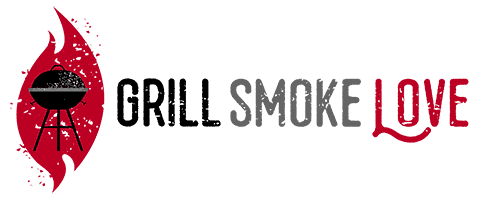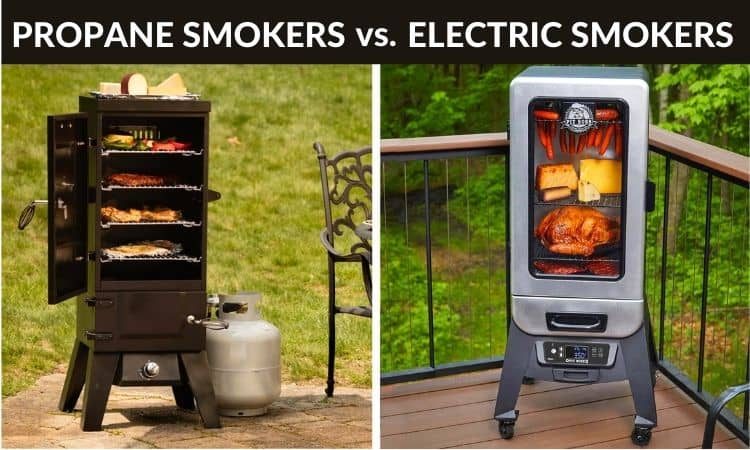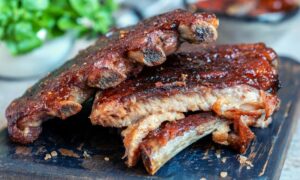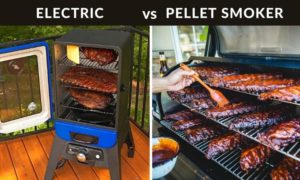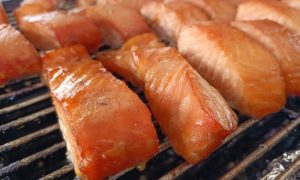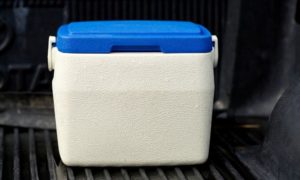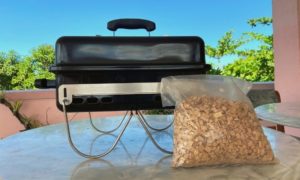If you’re looking for an easy-to-use and inexpensive smoker, you’ll want to get to know the differences between electric and propane smokers.
These appliances are very similar in appearance, but thanks to a few quirks, one might be a lot better for your cooking than the other. The nice thing is that there is a wide selection of both types of smokers available and the cheapest ones
So let’s break each type down and see what makes them tick.
Propane Gas Smoker Overview
Propane smokers are very similar in construction and functionality to the standard backyard propane grill. Both appliances run off of the same 20-pound propane cylinders and both of them use very similar conventional burners.
The difference, of course, lies in where the heat goes and how it cooks the food.
The propane smoker is built into a cabinet. There are usually between 3 and 5 wire shelves in the cabinet, and you can fill it up with food in any way.
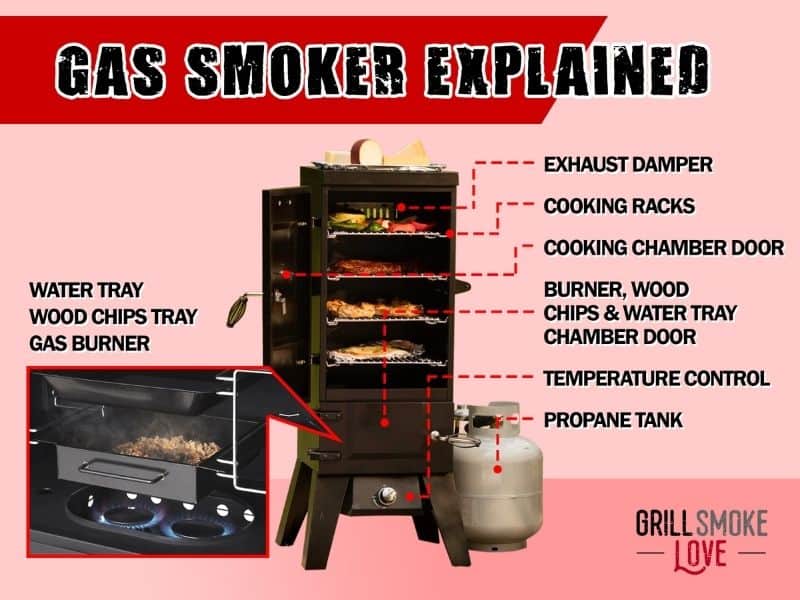
Smoking is more like roasting in the oven, so you don’t have to worry about hot spots on the grill or uneven cooking. Best of all, you can use hooks to hang substantial items, like rib racks.
How It Works
There’s nothing magical or incredibly technical about propane smokers.
An external propane tank feeds fuel to a standard burner at the bottom of the cabinet. There’s a control knob, just like on your gas grill, which will make the burner hotter or cooler. It’s a temperature control knob, but only in the simplest sense.
Just like your grill, you must watch a separate thermometer to get to the desired smoking temperature.
The burner or burners heat a tray that holds wood chips and water. This tray absorbs most of the heat from the burner to increase the cabinet temperature and get the wood smoldering.
At the top of the unit, the exhaust damper can be opened or closed to encourage airflow through the system. This is another crucial component in the temperature formula. Opening the damper more will increase airflow and smoke but will also lower the temperature.
Using a propane smoker will feel familiar to anyone who has used the typical gas grill or a gas oven. It’s more art than science.
In other words, you have to exercise some creative trial and error to find the temperature control and damper combination that keeps your smoker box at the proper cooking temperature.
Pros and Cons of Propane Smokers
Pros:
- Can reach higher temperatures than electric smokers
- Simple design is easy to fix and parts are easy to find
- Use it anywhere — no power outlet is needed
- Propane smokers usually produce more authentic flavors closer to charcoal smokers compared to electric smokers
Cons:
- Most lack the modern touches that electric units have (e.g. Bluetooth connected cooking apps)
- Temperature control is not always perfect and requires monitoring
- Buying, handling and storing the propane tanks takes some effort
Electric Smoker Overview
From the outside, an electric smoker looks almost identical to a propane one. There’s no propane tank, though.
The cabinet and cooking area are very similar and the layouts are comparable.
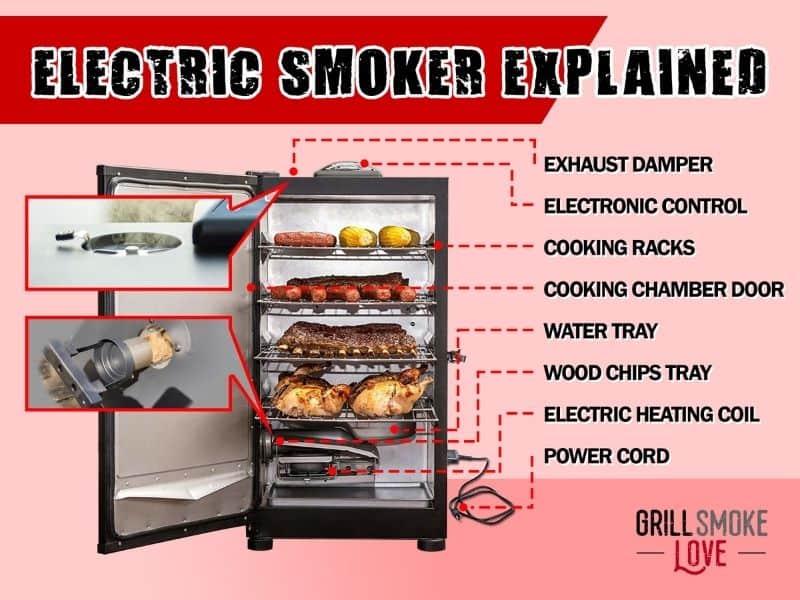
The differences all lie in the power source — and the limitations each power source presents. Electric smokers need — you guessed it — electricity!
And that means you’re limited to using the smoker somewhere near an outlet. Most people won’t mind that, but you might be out of luck if you were planning to use it on a camping trip.
How It Works
To use an electric smoker, the cord is plugged into an outlet and its temperature dial is selected.
Electric smokers usually have you set a target cooking temperature, and then the unit maintains that temperature. This is a lot simpler than with propane versions.
The rest of the process looks the same as with the propane smoker. The heat and smoke come from the bottom of the cabinet and rise over the food thanks to convection.
The heating element looks a lot like those found in conventional kitchen ovens. It heats the wood chips tray to the desired temperature.
Electric smokers have a dial that allows you to set a precise temperature. And because electric heating elements are very precise, these smokers allow you to cook at lower temperatures than gas does.
If you’re cooking delicate items, like cheese or fish, an electric smoker is the way to go.
Pros and Cons of Electric Smokers
Pros:
- Very good temperature control, much like a kitchen oven
- Set-it-and-forget-it convenience
- Safe for use in garages or sheds — no carbon monoxide gas danger
- Has the ability to keep very low cooking temperatures — perfect for cold smoking (although often a separate cold smoker attachment is recommended)
Cons:
- Needs an appropriate power outlet to work
- Caution is needed in damp environments or during rain due to electricity
- Doesn’t get as hot as gas smokers can
- Less flavor compared to charcoal or wood-fired smokers used at barbecue restaurants
Electric vs Propane Gas Smoker Differences
Now that you have the basic idea of how each one works let’s look at some of the differences between electric and propane smokers.
Ease of Use
When looking for the easiest type of smoker to use, the electric smoker is the clear winner.
An electric smoker is easy to use from the start since all you have to do is plug it in and set the temperature. Then, much like an oven, you can walk away knowing that it will hold that temperature through the entire cooking process.
On the other hand, some propane models have digital thermostats built-in. These come pretty close to the experience of using an electric smoker.
Refilling and exchanging propane tanks can be a drag, too. If you already run a backyard grill, you might be in the habit of keeping a spare tank around.
If that sounds like you, you won’t mind adding one more tank to the mix to use with your smoker. But if you’d rather plug the thing into the wall and be done with it, an electric smoker will save you some trips to the hardware store.
When you are looking for a portable smoker to take along on camping trips, then a small propane smoker is probably the better option.
Taste
It’s a close match when it comes to the results of the cooking.
The flavor of smoked goods comes primarily from the smoke and the long, slow cooking process. Both smokers accomplish these two things in a similar enough fashion that the differences in taste would be difficult to detect.
However, the extra heat that a gas burner gives you is handy when it comes to appearance and textures. It will provide enough boost to get that delicious smoked crust on the outside of the meat, which is difficult to achieve with electric smokers.
Temperature Range and Versatility
The common cooking temperatures for BBQ foods are between 225 degrees and 250 degrees Fahrenheit. This is known as “hot smoking,” and it’s the most typical form of the art.
The difference between electric and gas smokers is more about what you can cook and how quickly.
If you’re eying classic barbecue fare, like brisket or pork shoulders, you might also be looking for a nice crispy and smoky crust on the meat. In that case, the extra horsepower that a gas burner provides will come in handy. Many gas smokers get hot enough to be used as roasters, too.
If, on the other hand, you’re also looking to cook some more delicate items well embued with smoky flavors, the electric unit will give you the most versatility. It can cook those big rib racks and pork butts, but it can also handle fish, bacon, or even cheeses with the proper techniques.
Size and Cooking Space
The base cabinets that the two types of smokers are built off are nearly identical, so there is very little difference in their size or the amount of space available for food.
Remember, though, that a gas unit will require storing the propane tank and probably a spare one too.
Maintenance and Cleaning
Both types of units clean reasonably easily. The racks are removable and can be washed in the sink or dishwasher.
The cabinet design of these smokers means that all food drippings should ideally wind up in a drip pan. To make it even easier to clean, you can line the bottom and edges of the cooking cabinet with foil. The wide-open door of these units makes it an easy job.
Beyond the racks, drip pan, and bottom level, there isn’t much to clean in these machines. The low cooking temperatures mean you won’t be dealing with splatter or grease like you must with a grill. The smoke may add a patina to the cabinet over time. That is hard to remove, but it also doesn’t affect the cooking in any way.
There’s no maintenance on these units other than keeping them clean. If you’re leaving them outside, it’s a good idea to invest in a cover to keep the sun, rain, and snow off of them. Clean up any paint chips immediately. If you can store it indoors when not in use, perhaps in a garage, it will last longer.
Spare parts for both types of smokers are pretty easy to come by.
Price and Running Cost
Electric and gas smokers are similar enough in construction that they’re priced almost the same. So a simple electric smoker will run about the same price as a gas unit with the same features.
But you can get a lot more functionality with an electric unit. If it comes with toys like Bluetooth connectivity and remote functionality, expect to pay more for those premium options.
The running cost of a smoker entirely depends on energy costs in your corner of the world. If you have access to your home’s electricity, that will be the cheapest option nine times out of ten.
Propane refills or exchanges can be quite pricey in some areas.
Reliability and Weather Effect
Electric and propane smokers are simple machines that are unlikely to give you any problems. They’ll work through any conditions you throw at them.
But the cabinets of smokers are often built thin. Instead of relying on heat retention, as many charcoal smokers do, these units rely on a steady heat supply from the burner.
As a result, they need a constant feed of power to hold their temperatures. If it’s very cold outside, you may be pushing some electric units to their limits.
Propane Gas vs Electric Smokers – Final Thoughts
If you’re looking for the best value and the greenest option, there is no doubt that electric smokers are the way to go.
But if you want the most power and the best versatility, propane allows you to take it anywhere. It also gives you convenient independence from the power grid if the power goes out in your area.
Now that you’ve mastered the basic differences between electric and propane smokers, you probably know which one will work best in your backyard.
Whichever way you go, nothing beats the smoky goodness of a weekend barbecue done right!
Looking for more options to choose from? Read this guide with a comparison of pellet grills vs smokers.
